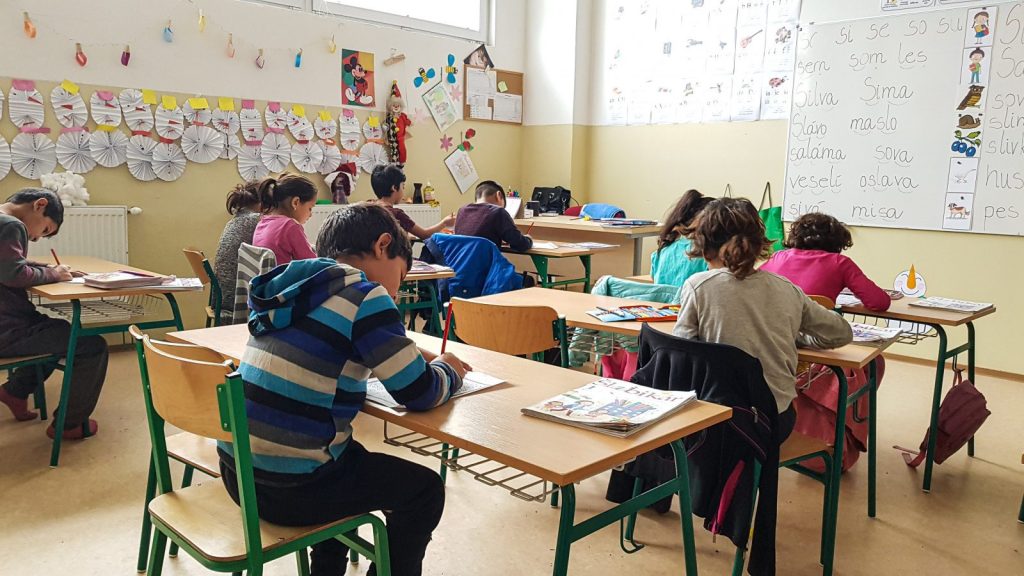I am in self-isolation writing from my home, with my two daughters interrupting now and then to bring me coffee, asking me questions, telling me stories, teaching me things. My 9-year old often gives me life hack tips based on the videos she sees online. Yes of course she uses the Web, under my supervision, now more than ever before given the COVID-19 confinement. This lockdown is plunging my family even further into the digital age through the use of technology for schooling, working, socialising, leisure and staying in touch with the family, which will be our own personal experiment. This got me thinking of other ongoing experiments, more societal in nature but still close to home, and how they could lead to major transitions and even full reinvention. So I started scribbling down some notes.
In Belgium, since the beginning of the semi-lockdown on 16th March all schools are closed but with basic childcare available for working parents whose professions do not allow them to telework and for parents needed in key sectors like public health (from pharmacies to hospitals) and manufacturing. There are also new rules and working methods being phased in for care services for persons with disabilities and older people, which will likely have a huge impact on working carers. All families, including working families, have a right to support: a mix of access to resources, care services, and leaves and flexible work arrangements from their employers – but now it is also a matter of public health and survival, to ensure that workers with family care responsibilities, women and men, can still be in a position to work in key sectors related to this health crisis we are going through.
Working families was going to be one of the topics of our COFACE meeting on 16th March in Brussels (cancelled at the last minute) namely discussing with businesses and trade unions (Business Europe, CEEP, EPSU, ETUC and SME United) the challenges of building family-friendly workplaces and how to move forward. This typical debate in the COFACE crowd has now been taken to the mainstream through a massive global economic experiment of imposed teleworking and flexible work arrangements for workers across the world. While this crisis will put a huge strain on small, medium and big businesses, it might also lead them to innovate like never before, leading to an overhaul of workplace dynamics and working time. Namely using the full potential of technology to change human resources policies towards an output culture which allows workers full flexibility and autonomy to achieve results while finding true work-life balance.
We at COFACE are part of this imposed experiment with the Brussels-based team, through decentralised working, agreeing on key tasks to be achieved over the next month, and using technology to connect bilaterally or with the full team. The same goes for connecting with our member organisations across Europe. On 16th March, we replaced our original physical meeting with a short video conference to discuss the transposition of the EU work-life balance directive in ten countries – to me it was a revelation, seeing how online tools genuinely allow for effective and meaningful discussions, and seeing how many people are actually using these tools already! Sure, it was new and challenging for some, but still useful for information exchange and it brought us all together in solidarity as we collectively embraced new working methods. This crisis is pushing our network out of its comfort zone and into what I consider a European social experiment, forcing us to rethink transnational working and to stay effective so that we can be ready for cross-country support mechanisms as families across Europe become increasingly affected by the pandemic. As a network partly funded by a European Commission grant to drive innovation and forward-thinking between civil society in different countries (under the Employment and Social Innovation Programme), I feel this imposed social and economic experiment is an important time of transition which will potentially lead to lasting changes in our working methods from 2021.
The societal change and transition we usually talk about in COFACE is the demographic transition, which, in a nutshell, is the historical shift we are seeing in Europe towards societies with smaller and older populations as a result of low birth rates and low death rates, with important consequences for society, the economy and the planet. I have seen some jokes circulating on social media about the fact that imposed confinement will lead to a mini baby boom. I would be delighted to see a new generation of “quaranteens” emerge as a result of this lockdown, not only for society and the economy, but especially for the many out there who desire children. Families are and will always remain the basic unit of society, ready to support each other as a natural social safety net.
Who are you with during this lockdown? Who is supporting you right now? Who are you mostly calling these days? While this COVID-19 crisis might not lead to more babies, I would like it to trigger a move away from the “F-word” and “taboo” thinking around family policy as pro-natalist, conservative and anti-gender equality. Instead we should be referring to positive and intergenerational family policies adapted to 21st century realities such as migration flows, co-responsibility between women and men, work-life balance, family diversity, and assistive reproductive techniques so that young people can be free to fulfill their family wishes.
The imposed lockdowns across the globe are undoubtedly going to be challenging for all of us, and we are likely to suffer and see loved ones suffer. Change is hard. Transitions are tough. But they’re also great opportunities for rethinking societal priorities and the very functioning of our economic system, as well as reinventing our personal and family lives. I for one have chosen to see this unique moment to be creative and rethink everything – in my work and family life.
_________________________________________________________________________________________
**DISCLAIMER: All opinions in this article reflect the views of the author, not of COFACE Families Europe**
About the author:
Elizabeth Gosme, Director of COFACE Families Europe and mother of two rebel girls. Active in the EU political arena. A true music lover. Firm believer in the six core values of COFACE to build inclusive societies: social inclusion, intergenerational solidarity, human rights, non-discrimination, empowerment, and equal opportunities.
Twitter @COFACE_EU @lizgosme





